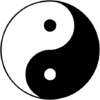There are many allegories in Taoism and much like Greek Gnosticism it is heavily experience based, though there are a body of philosophers, referred to as sages, who are viewed as having deep insight into the Tao, like Chuang-Tzu and other students of Lao Tzu.
Does Taoism have monks and nuns like Buddhism? No, and in fact that concept is foreign to Taoist thinking. The only purity that can be attained in Taoism is harmony with the Tao.
So how is one a Taoist from a participation perspective? It’s a personal pursuit, almost like a science. It is like seeing experience from a non-personal perspective. It is sort of a combination of the concepts of physics and metaphysics without placing human ambition over the experience of the natural way itself. As a matter of fact, in the thinking of Taoism the errors of science are not mysterious. We try to bend the natural order to serve us rather than seeing how it already does, and thus poison ourselves and destroy things we were dependant on.
There is a religious Taoism. They see Lao-Tzu and the immortals as having been embodiments of the Tao, and believe that they can grant favour and understanding of the Tao.
Do they incorporate any ‘practice’ disciplines? They do practice meditation, and martial arts practices. Tai-chi is Taoist. It is the Tao of chi in the body. Some of it is Bon hold over practices.
What kind of meditation do they favour? Astrological “pathworking” much like the teachings of the kabbalah, and internal alchemy as well as breath control.
Pathworking is a practice known as “holding the one”. Which is sort of like mental tai-chi. No somatic engagement. The body held still and feeling the movement of the Tao within the mind is viewed as an inner fire. This is basically my own meditation technique, though I don’t simplify it as much. They are sort of anti-intellectual, especially religious Taoists, but they don’t actively oppose intellectualism.
How do Taoist see evolution in science? They fully embrace the concept of evolution. They see the human form as having arisen from the Tao, and they see that humanity can evolve even spiritually, but that striving for an abstract goal is to invite confusion. They see intellectual function as a part of the Tao, but would warn against obsessive focus. The Taoist concept of spiritual evolution is letting life, knowledge and all, flow through oneself and one can attain the next step by yet not striving to attain anything. Unity with the Tao. In Taoism there is no imperfection. No failing, except resistance to the Tao, and this event isn’t a failing because it can’t persist. Spiritual evolution is accomplished once they realise it consistently.
Do they have reincarnation? Yes. They see every being as part of the universal force that is the Tao. The spirit or chi is the constant and in fact it endlessly cycles.
Does Taoism have any ties to Bushidou (way of the samurai life)? Not directly. But indirectly, yes, and they aren’t contradictory. The way of adaption in Bushido is very Taoist. Bushido has its roots in Buddhism, and Buddhism and Taoism became tightly linked by the Buddhists themselves. The ‘one light’ of Buddhism and the Tao are basically the same concept.
They seek the natural way both in Buddhism and Taoism. The Buddhists don’t bother with an external way, nor do they refute that one exists. The Taoists focus very much on the external way and on how it affects and reflects itself in us. So more focus on interaction with the world then Buddhism. Many Chinese works of art depict human figures as very small in a landscape. It’s for a reason. They are depicting that man exists as a part of the world.
My personal beliefs are very Taoist. Most of my insights I convey in this blog are drawn from my experience of the world itself and in myself.
Your thoughts are welcome. Be well friends.
Travis Saunders
Dragon Intuitive
~science,mysticism,spirituality~




Leave a Reply